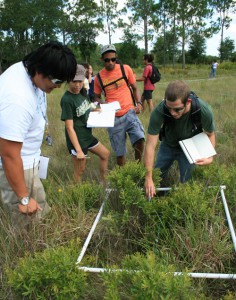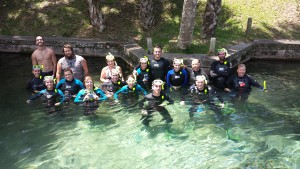For students enrolled in Jennifer Fernandes’ field biology class, their classroom is everywhere and class activities involve everything from snorkeling reefs in Key Largo to collecting scorpions in the woods.
In SPC’s Field Biology of Florida class (BSC 2250C), hands-on learning is the instructional method of choice. Students spend only the first day in an actual classroom – the rest of their semester is spent in idyllic outdoor environments across the state.

“Field Biology is taught in a different format than most courses in that all of our lectures are done in the field all over Florida,” said Fernandes, Assistant Professor of Biology who has been teaching the class at the Tarpon Springs Campus since Fall 2010.
While looking for a way to engage her students in active student learning and success, she recognized that students learn best when they get their hands dirty. So she opted to take her instruction out of the classroom and into the environments they would be studying.
“It’s been helpful to really get a hands-on experience way of learning,” said Andrew Hamblin, 28, a public safety administration student who transferred from Hillsborough Community College in time for the Spring 2014 term. He thinks learning from direct experience is more effective than traditional learning because Fernandes is able to point out specifics in terminology and processes rather than just having students read from a book.
“You can see what is written on paper but you can’t really understand how it works in the same way,” Hamblin said.
Class field trips vary in content and location depending on the time of year and weather. The spring term often includes weekend camping trips while summer offers snorkeling and winter brings manatees to study.
“In this type of setting, every single student is engaged and they’re all interested in learning because of the different modality,” said Fernandes, who wanted to create a course that would make science interesting for majors and non-majors alike.
Since taking learning outside the classroom, students have journeyed to:
- Crystal River
- Rainbow Springs
- Honeymoon Island State Park
- Caladesi Island State Park
- Weedon Island Preserve
- Highlands Hammock State Park
- Turtle Hospital
- Little Manatee River State Park
- Kissimmee River Restoration
- Wekiwa Springs State Park
- Hillsborough River
- John Chesnut Sr. Park

During local trips, students carpool to local parks and preserves. For more distant trips, SPC transports students in college vans to locations like Key Largo, Everglades National Park and Topsail Hill State Preserve.
“This class definitely put all of us students in areas that we were able to better understand what we were being taught in regards to the ecology, the plants and animals, and the different natures of the areas that we visited,” Hamblin said.
Students also engage in active learning through volunteer work, like collecting scorpions for research and creating oyster domes for Tampa Bay Watch, a nonprofit organization dedicated to habitat restoration and protection.
“This way they have a different idea of what science truly is,” Fernandes said. “It’s not something that’s boring. They understand it’s actually very hands-on every day, and it helps them make better decisions in life.”
Because of the logistics involved with teaching the course, the class size is capped at 20 students. An additional benefit of this smaller setting means students work more closely with fellow students and develop better working relationships with their peers.
“Every semester, the students absolutely love the class,” said Fernandes. “The biggest things they say is that they learn so much more than they would in a regular classroom setting; that they actually retain the information and develop friendships in a class that they would never have done before.”
Hamblin enjoys the camaraderie he experiences in the class.
“When you do other classes, typically you’re just there to do the work and you don’t associate with many of the other students,” he said. “However, this class really kind of brings that all together where you’re talking and discussing all the subjects with all the students.”
“We’re all communicating and helping one another out and having a great time together,” he said.

